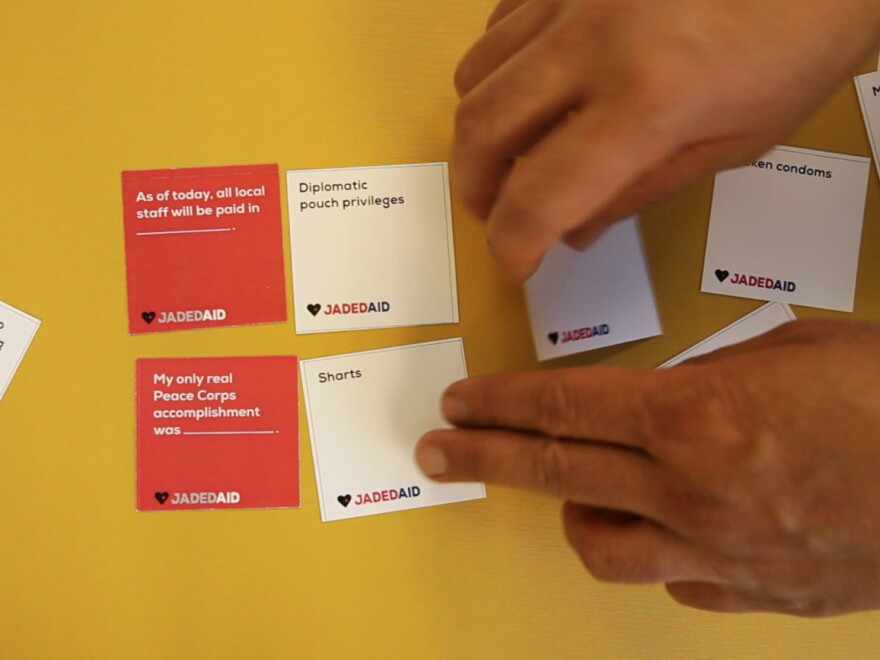The Goats and Soda team is playing a game, and one of us pulls out a bright red card with this line: "Angelina Jolie will now be a special envoy for ____."
Each team member shuffles through a handful of white cards and picks an answer to fill in the blank. This is what we get:
"Explaining that Chad is a country, not a person"
"China!"
"Antimalarial-induced hallucinations"
"George Clooney's wife"
Now comes the fun part. Which card do you choose?
We're playing Jaded Aid, a cheeky card game made by and played by humanitarian workers. Modeled after the fill-in-the-blanks party game Cards Against Humanity, it satirizes the mindset and mumbo-jumbo of aid and development.
"The game provides a venting mechanism for a lot of the wide-eyed young development workers who really do want to make a difference," says Teddy Ruge, one of the co-creators of Jaded Aid. "But they run up against these systems that won't let them move as fast as they want to move." He knows what that's like. Ruge is a writer and entrepreneur who's started an agriculture business, a collaborative workspace and a mobile payment app in his home country of Uganda.
With cards like "an unpronounceable acronym," "a vial of Bono's tears," "saving Africa one adoption at a time," and "giving up any hope of a stable relationship," the 200-card deck shines a light on aid stereotypes, gets real about living in the field and pokes fun at jargon. And depending on your personal sensitivities, the cards could be offensive or NSFW.
If you've never had to deal with the U.N., raise awareness for a disease no one's heard of or get a sixth round of approval on a climate change communique, you may need Google to guide you through the references.
"The whole deck was designed as an inside joke for the international development community," says Wayan Vota, another co-creator, who, like Ruge, works in global development. "Even the logo — it's actually the red and blue from the official USAID branding guide."
Last September, the creators, Ruge and Vota and Jessica Heinzelman set out to to raise $12,000 to develop and print the game in a Kickstarter campaign. They blew past the mark within 48 hours and ended up raising $51,000 from more than 1,600 backers. And while they were funding the project, more than 2,500 people submitted their own card ideas. Many were based on real-life experiences, like "an iPhone at the bottom of a pit latrine."
"We were shocked. We thought we'd go to the wire on financing it," says Ruge. "But then we were like, now what? This is actually real. We have to print these cards now and ship them."
So far, they've shipped and sold decks — available on their website for $19 — to aid workers, global researchers and expats in the Democratic Republic of Congo, Myanmar and beyond. If you live outside the realms of a "functioning postal system" as they put it on their website, you can download a PDF copy of the game and print your own cards for free.

Many who play Jaded Aid find it cathartic.
Manpreet Singh, a project manager for Dalberg, a global consulting firm, tried a round with a group of development workers in Nairobi, Kenya.
"We played it for an hour or two after brunch and it was great," he says. "It's a fun way of talking about the cynicism and frustrations you face. Now we want to add our own cards."
Ben Lyon, who works in a tech-startup in Hanoi, Vietnam, says "It gives you artistic license to make fun of the things that otherwise depress you. It forces you to talk about things you otherwise might hold inside. And when you play with kindred spirits, you realize you all have similar opinions."
But not everyone's a fan.
"Occasionally we get the school marm who says things like, 'I can't believe you're saying such naughty things about our industry. People outside the industry are going to use this against us,' " says Vota, who works for an aid organization based in Washington, D.C.
But Vota and the other creators hope the opposite comes true: Aid workers will be inspired to bring about change.
"Hopefully people play Jaded Aid at night, and the next morning wake up and say, You know what? Let me think about that," says Vota. "That really hit on some issues that we should be dealing with today in the bright light of the morning sunshine."
And what global development issues could he mean?
"Propagating heinous American stereotypes"
"Ending peace and harmony by introducing democracy and elections."
"Pleasing the donor at any cost."
Pick a card, any card!
Copyright 2023 NPR. To see more, visit https://www.npr.org.


